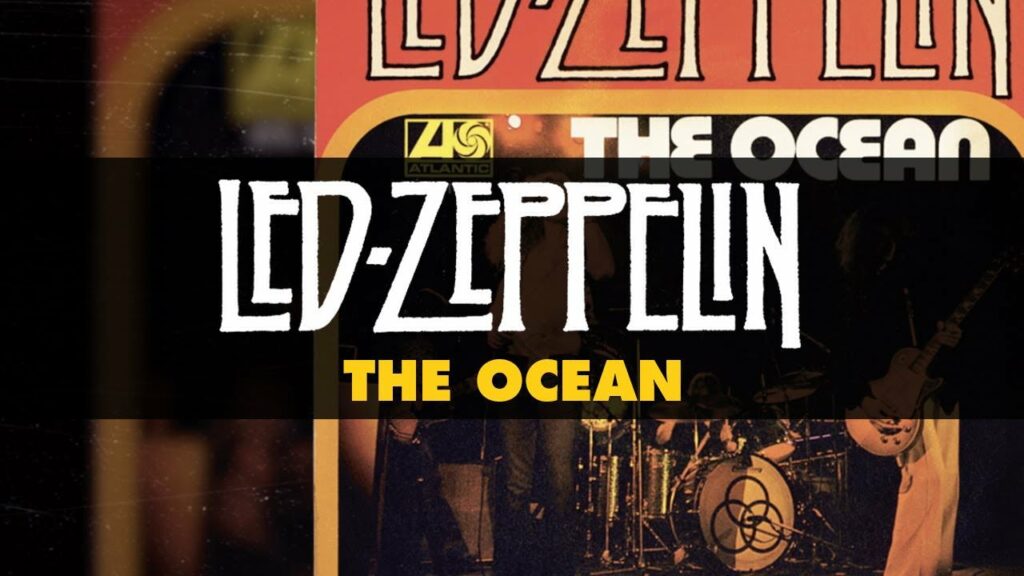- This topic has 0 replies, 1 voice, and was last updated 1 week, 3 days ago by
 chubes.
chubes.
Log in to view. Or, click here to read the blog version of this post (with ads).
-
#56392| April 23, 2024 at 11:33 am
 chubesHMFICRank: Frozen Foods IslePoints: 10483.75
chubesHMFICRank: Frozen Foods IslePoints: 10483.75The Meaning of Led Zeppelin’s “The Ocean”
Published: January 3, 2024
As the closing track to Led Zeppelin’s 1973 album, Houses of the Holy, “The Ocean” brings with it one of the crispiest guitar leads in the band’s entire discography. That riff drives the whole energy of a song that could serve just as well as an opener as a closer.
With such a solid rock & roll arrangement, one might not even consider the song’s lyrics. This is appropriate, since the lyrics are mostly about playing music before a crowd of people, depicted via the metaphor of “The Ocean.” There are also sections of the lyrics that are ad-libbed, “oohs,” “ahs,” and “nas,” giving the song a loose edge that makes it really fun and accessible.
Still, the focus on fun aside, you couldn’t expect Robert Plant to refrain from weaving some deeper imagery between the lines. This post dives into the lyrics of “The Ocean” and deciphers their meaning.
“The Ocean” Lyrics Meaning
Verse One
Singing in the sunshine, laughing in the rain
Hitting on the moonshine, rocking in the grain
Got no time to pack my bags, my foot’s outside the door
I got a date, I can’t be late, for the high hopes hailla ballFirst verse to “The Ocean” by Led Zeppelin.
The song opens with an image of pure joy, singing in the sunshine and being unbothered by rain. Drinking moonshine and continuing to play music, or “rocking in the grain,” meaning grain alcohol.
On the flip side, he’s got no free time, Led Zeppelin is always on the road. He’s got another show coming up, and he’s got to get there on time.
It’s worth nothing that the “high hopes hailla ball” lyric has been highly-debated. The official lyric is “high hopes hailla ball,” but it’s not clear what Plant actually sings on the recording. Some say that it sounds like “the hellhound’s at my door,” which has been called a reference to the Robert Johnson song, “Hellhound On My Trail.”
I also have to note that if this were the case, Robert Plant would share a reference in common with Robert Hunter, via the Grateful Dead song “Friend of the Devil.” Again, this is just fan speculation.
Verse Two
Singing to an ocean, I can hear the ocean’s roar (Ooh)
Play for free and play for me, and play a whole lot more, more (Ooh)
Singing ’bout good things and the sun that lights the day (Ooh)
I used to sing on the mountains, has the ocean lost its way?Second verse to “The Ocean” by Led Zeppelin.
As I mentioned, “The Ocean” is a metaphor for the sea of people in the crowd at a Led Zeppelin concert. It’s no secret that they were massively popular in the 1970s, often performing to crowds in the tens of thousands or more.
The crowd is highly demanding, wanting him to play for free, and continue playing. This suggests a slight disdain with the rapacious audience, but it could also be a reflection of the joy of playing music, because many say that most of the joy comes from sharing in, and curating a communal experience.
He closes with a reflection of a past time, singing on the mountains. The undertone is a longing for a more solitary musical experience. He wonders if he should follow the demands of “The Ocean.”
The core image of the song is the juxtaposition between the ocean and the mountains, two natural entities that are often viewed as opposite ends of the spectrum.
Ad-libbed vocals and a guitar solo lead us to the third verse.
Verse Three
Sitting ’round, singin’ songs till the night turns into day (Ooh)
Used to sing on the mountains, but the mountains washed away
(Ooh)
Now I’m singin’ all my songs to the girl who won my heart
She is only three years old and it’s a real fine way to startThird verse to “The Ocean” by Led Zeppelin.
The third verse touches on nostalgia and hope, with memories of playing music all night long. Again, the mountains return, with Plant noting that they were washed away by the ocean. Perhaps the fame took away some of the joy in music for Plant, since it was now much more difficult for him to do it without being engulfed by the sea of fans.
He also brings in a heartfelt reference to his daughter, Carmen Plant, calling her the girl who won his heart. The lyric is a notion of pure love and joy for his daughter, and what she has brought to his life in just three years.
Bridge
Oh yeah
I sure is fine
I blow my mind
When the tears are going down
Yeah, yeah, yeahBridge to “The Ocean” by Led Zeppelin.
The bridge is about a deep connection to the music, to the point of blowing his mind and bringing tears to his eyes. It’s a sign that despite the overwhelming nature of “The Ocean” of fans, Robert Plant still feels innately connected to the music, contributing to its lifelong hold on him.
In the end, “The Ocean” seems to be about accepting that music, and musical talent, has been both a source of immense joy, and of stress and expectations. And Robert Plant wouldn’t have it any other way.
Listen to “The Ocean” by Led Zeppelin below.
Led Zeppelin – “The Ocean” (1973)
- You must be logged in to reply to this topic.
Users Currently Online: 1
Most Ever Online: 8 on 02/06/2024
Total Members: 194